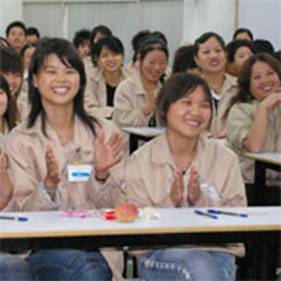New war of the flea: CSR and labor activism in China
The computing giant is recognized as having one of the most advanced and progressive CSR programs in the world. After SACOM launched the "Clean up your Computer" campaign in 2006, exposing poor labor practices at electronics factories, HP was the only major brand to respond positively. SACOM began talking to representatives of the company's Social and Environmental Responsibility (SER) program in January 2007 and in August the same year signed an agreement to coordinate worker training at Delta and Chicony.
 |
|
Factory workers at Chicony Electronics in Dongguan take part in a labor rights training program organized in partnership between Chicony, Hewlett Packard and Hong Kong NGO SACOM. |
Although SACOM organized the training in collaboration with Hewlett Packard SER program, it definitely does not see itself as part of the Corporate Social Responsibility industry. Jenny Chan says "We have never received any money from HP. We will not bend to corporate pressure to write a company-friendly report. SACOM will not become part of the CSR business."
Rather, activist groups like SACOM and Li Qiang's China Labor Watch are using what they see as the multinationals' Achilles heel – their concern over public image – as a weapon in the unequal battle between the international giants and their low-paid workers. Like a guerrilla band harassing a conventional army, they believe their pinprick attacks, a 21st century war of the flea, will eventually force concessions.
Many contract manufacturers are multinationals in their own right. Delta Group employs more than 60,000 people in factories in Taiwan, China's mainland, Thailand, Mexico, India and Europe. According to its website, it produces power supplies, visual displays, networking products and provides industrial automation and renewable energy solutions. Chairman and founder Bruce Cheng has made large donations to universities in Taiwan, and the company has its own CSR program.
The company says it views the SACOM training course as a routine matter. "Delta has been conducting the training courses by itself years before SACOM/LESN's training courses this time. Delta itself will continue to conduct its own training courses like before in the future. SACOM/LESN's training courses are a repeat program of Delta existing training program," the company told us in an email.
Delta told us that 65 percent of its Donguan workers are female and that the company "follows the minimum wages rule required by local government. Delta uses the minimum wages of RMB 770 (US$113) /person/month as a starting base. Delta workers can easily earn up to RMB 1300 - 1900 (US$190 - 278)/person/month."
Chicony vice president Chris Huang also indicated that their wages were around the legal minimum. SACOM's report on the training quoted him as saying "We pay workers in strict accordance with the Dongguan legal minimum wage law."
The problem is that the local minimum wage is very low. Although Dongguan is a major city with a population of nearly 7 million and all the usual bright lights and skyscrapers associated with modern China, it has built much of its prosperity on contract manufacturing. Less than 2 million of its inhabitants are registered as permanent residents; the rest are migrants from other areas of China. City bosses, whose performance is still judged mainly by GDP figures, have deliberately kept the minimum wage relatively low, well aware that in nearby Vietnam there are millions of workers willing to work for even less, should the multinationals that, after all, call the shots choose to decamp.
The cost savings of off-shoring production are spectacular. Average weekly earnings in US manufacturing industry in August 2009 were 624 dollars according to the US bureau of labor statistics. (Wages in the electronic appliances sector were slightly higher than average). That gives a monthly rate of US$2,704 (18,464 yuan) or nearly 24 times Dongguan's legal minimum wage or 14 times the lower, and nearly 10 times the higher, estimate of average earnings given by Delta.
For the workers at Delta and Chicony, the training courses provided an opportunity to solve mundane grievances. In the women’s dormitories at Chicony hot water was often unavailable in the evenings. Chicony management lobbied the local authorities to repair the local water supply and also installed a new central heating device, actions that the workers greeted with applause. Some workers also felt the company was making it difficult for them to resign. This turned out to be a misunderstanding, with workers believing verbal notice was sufficient and the company insisting on written notice. Once explained, the matter was resolved.
One lasting legacy of the training course is the telephone hotline at Chicony, now operated by a workers' committee which is 80 percent elected by the workforce. Vic Lee, one of the more sympathetic managers involved in the program, said "It not only helps workers to understand their labor rights and obligations, but it offers them counseling services and relief from emotional problems. Many factory workers are migrant workers who face challenges being away from home in a new environment."
From the point of view of SACOM and the other campaigners involved the most important result of the training has been to give the workers the sense that they have the power to influence their working conditions. It is this heightened sense of dignity and empowerment that will, in their view, lead to a long term improvement in their wages and conditions.
"We have confidence in workers that they will carry on their good fight, and after the training, they will gain more power in defending their rights. When workers learn negotiation skills they become brave to bring up previously unspoken issues," said Jenny Chan.
 0
0 







Comments